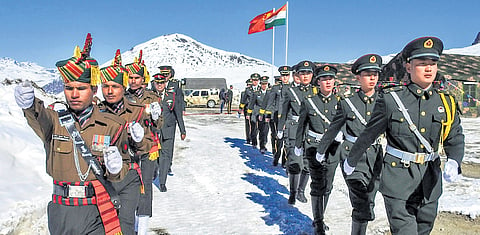'Crosswinds' book review: A close look at the events crucial in shaping India’s China policy
In Crosswinds: Nehru, Zhou, and the Anglo-American Competition over China, former Foreign Secretary of India Vijay Gokhale invites readers into the complex interplay of geopolitical strategies that characterised the early post-WW II period in Asia.
The book examines India’s diplomatic entanglements amid the burgeoning rivalry between the Anglo-American powers and a nascent Communist China under Chairman Mao—a country in the middle of a revolutionary transformation.
Gokhale’s narrative is deeply rooted in his extensive experience and understanding of diplomatic relations, providing a unique insight into India’s role in shaping the regional dynamics of Asia during this tumultuous time. He sets the stage by describing the post-war geopolitical vacuum in Asia, particularly following Japan’s defeat. This period saw the United States and the Soviet Union emerge as superpowers with conflicting ideologies, casting long shadows over the region’s political landscape. At the heart of this narrative is India, under the leadership of Prime Minister Jawaharlal Nehru, whose vision for a post-colonial order was crucial in defining the country’s foreign policy. The book explores the period between 1949 and 1959, a decade of significant upheaval and realignment crucial in shaping India’s China policy.
One of the central themes of Crosswinds is India’s recognition of Communist China in 1949. Gokhale explores how this decision was influenced by Nehru’s vision of Asian solidarity and his understanding of colonial legacies. He notes how Nehru “made a personal visit to China in August 1939, telling Rabindranath Tagore that he was going because “the present will pass and merge into the future, and India will remain and China will remain and the two will work together for their own good and the good of the world”.
However, this recognition came when the United States was grappling with the concept of ‘losing’ China to communism, which created a significant strategic dissonance with India. Gokhale discusses various international crises, such as the 1954 Geneva Conference and the Taiwan Strait crises (a series of conflicts over control of the island of Taiwan), illustrating how India navigated these challenges with limited resources, and often conflicting interests with Western powers. However, the realisation that China was not the envisioned friend or partner led India to reconsider its stance towards the US.
The book highlights that in a correspondence with VK Krishna Menon (India’s Defence Minister, 1957-62), Nehru expressed doubt about India’s ability to play a decisive role in the Cold War, acknowledging the overwhelming forces at play. Despite calls from Eisenhower to intervene in nuclear disarmament negotiations, Nehru hesitated, realising that India’s influence was limited. The book details historical events and critiques the decision-making processes within India’s foreign policy framework. Gokhale points out the lack of coherent strategy and the disconnect between the government and strategic experts, often leading to misinformed and reactionary policies with long-standing implications.
Nevertheless, Crosswinds is not just a historical account; it serves as a mirror to contemporary issues and offers enduring lessons from the past. Gokhale draws striking parallels between the geopolitical dynamics of Nehru’s time and current international relations, particularly in the context of escalating tensions in the Taiwan Strait and the broader US-China rivalry. In one of his recent interviews, Gokhale says that the “reason why the 1950s is important is because the Taiwan issue dominated the discussion on the competition between China and the United States then and it appears to be coming back as the central point in their relationship now”.
Recent events, such as the Trump administration’s trade war with China and the subsequent shift in global manufacturing centres, with countries like India, Vietnam and Bangladesh poised to replace China as leading exporters, underscore the book’s relevance. Moreover, India’s efforts to diversify supply chains, nurture indigenous industries, and cultivate strategic partnerships underscore its broader goals of self-reliance and sustainable economic growth. These developments underscore the complex interplay between economic interests and geopolitical tensions in contemporary India-China relations. Gokhale argues that the lessons from Nehru’s diplomatic engagements are crucial for today’s policymakers, particularly in understanding the complexities of international diplomacy and the importance of a balanced and informed foreign policy.
Gokhale’s narrative style is engaging and accessible, making complex diplomatic manoeuvres understandable to readers who are not well-versed in international politics. The author successfully intertwines detailed historical data with insightful analyses, providing a comprehensive view of the strategic decisions made by Indian leaders. The book is well-structured, with each chapter focusing on a specific event or period, gradually building a cohesive picture of the geopolitical chess game of the time.
Crosswinds significantly contributes to understanding India’s foreign policy during a critical decade of the 20th century. Gokhale’s critique of past policies reminds us of the importance of pragmatism and strategic planning in diplomacy. This book is a must-read for those interested in the intricacies of Asian geopolitics and the role of India in the international arena during a pivotal era of global realignment.
Crosswinds: Nehru, Zhou, and the Anglo-American Competition over China
By: Vijay Gokhale
Publisher: Penguin
Pages: 256
Price: Rs 699

